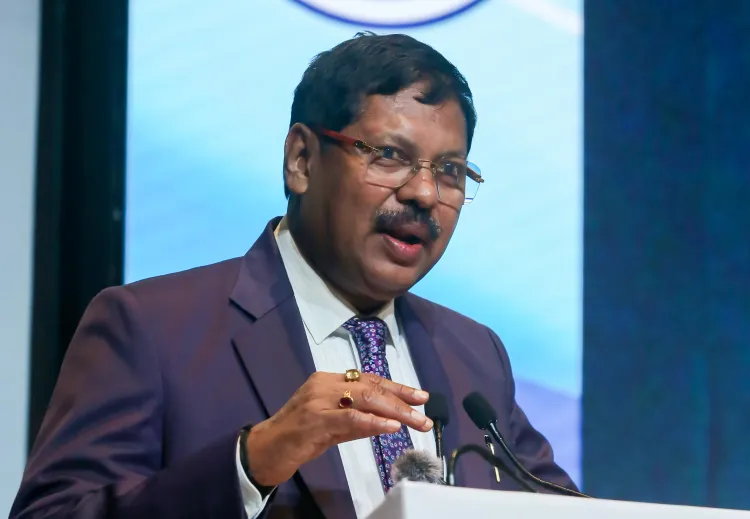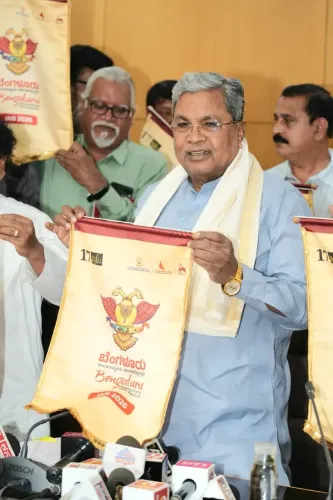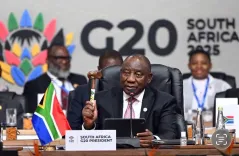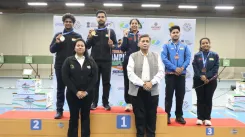How Should the Judiciary Act as the Guardian of Constitutional Conscience?

Synopsis
Key Takeaways
- The judiciary is a vital guardian of constitutional integrity.
- CJI Gavai emphasizes accountability and transparency in the courts.
- Bhutan serves as an inspiring model for balanced governance.
- The basic structure doctrine is crucial for constitutional preservation.
- Rights must be enforceable to impact citizens' lives meaningfully.
New Delhi, Oct 23 (NationPress) Chief Justice of India (CJI) B.R. Gavai highlighted on Thursday that the role of courts extends beyond merely resolving disputes, defining the judiciary as the “moral compass of the Constitution” tasked with upholding democracy, defending fundamental rights, and ensuring that power is held accountable.
Speaking during a lecture titled “Courts and Constitutional Governance” at the Fifth Wisdom for Future Talk Series organized by the JSW School of Law at the Royal Institute of Management (RIM), CJI Gavai provided profound insights into the evolution of India’s Constitution and its parallels with Bhutan’s constitutional framework.
“Courts are not just adjudicatory entities that settle disputes,” he explained, adding, “they are essential components of constitutional governance that uphold the rule of law, defend fundamental rights, and guarantee that every exercise of power remains accountable to constitutional tenets.”
The event featured notable attendees, including Princess Sonam Dechan Wangchuck, President of the JSW School of Law, Chief Justice of Bhutan Norbu Tshering, members of the Bhutanese judiciary, legal experts, and students.
Referring to Bhutan as “a living lesson in what an ideal civilization could be,” CJI Gavai noted that the country represents “progress in harmony—between human aspirations and the natural world, between tradition and modernity.”
“Bhutan’s example encourages global society to rediscover the art of harmonious and compassionate living,” the CJI remarked, emphasizing that the enduring civilizational bond between India and Bhutan is sustained by a shared spiritual heritage, most notably reflected in the teachings of Lord Buddha.
In his address, CJI Gavai revisited landmark rulings that defined India’s constitutional identity. He cited the Kesavananda Bharati v. State of Kerala case, stating that the Supreme Court had ensured that while Parliament could amend the Constitution, it could not modify or obliterate its fundamental structure.
“This decision marked a pivotal moment in constitutional thought, affirming that amendment cannot equate to destruction, and that the Constitution must retain its essence even as it evolves with changing times,” he asserted.
The CJI pointed out that the “basic structure doctrine” has become a cornerstone of India’s constitutional philosophy and has inspired courts globally. He identified rights such as free legal assistance, timely trials, education, health, housing, clean air and water, privacy, and the right to safeguard against climate change as integral to the broad interpretation of the right to life.
“This paradigm necessitates the State to translate constitutional assurances into real actions,” CJI Gavai stated, asserting that rights only hold significance when they are enforceable, accessible, and capable of influencing the lived experiences of citizens.
He emphasized that the authority of courts is derived not from coercive power but from moral integrity. “Public confidence is the judiciary’s most prized possession,” CJI Gavai remarked, adding that “Courts cultivate this trust through transparency, reasoned decisions, and consistent adherence to constitutional values.”
He stressed that every judicial ruling should embody fairness and moral courage, stating, “When citizens trust that justice will prevail without fear or favor, the legitimacy of the entire constitutional framework is fortified.” Concluding his speech, the CJI praised Bhutan’s constitutional focus on Gross National Happiness, calling it a constitutional lexicon that integrates justice with joy, rights with responsibilities, and liberty with collective prosperity.
“We not only share a geographical proximity but also a profound commitment to constitutional principles, justice, and human dignity. We are, and will remain, partners in the quest for a just and compassionate world,” he concluded.
Expressing his gratitude, CJI Gavai said, “Kadrinchey la”—the Bhutanese expression for “Thank you.”










